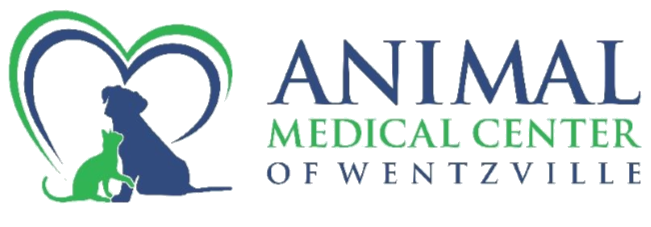Holiday Dangers for Pets
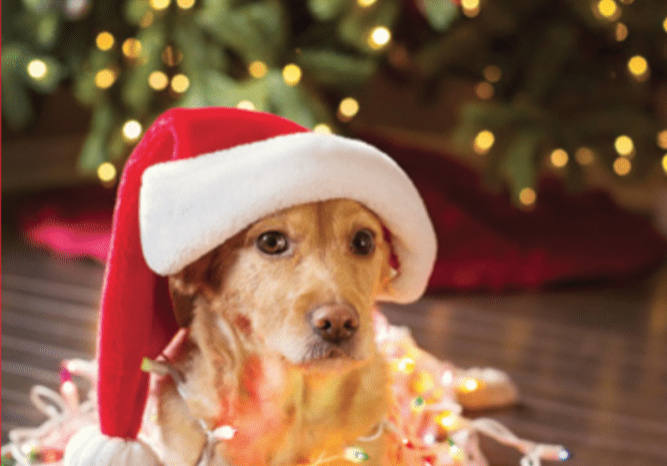
By Erin Quigley, DVM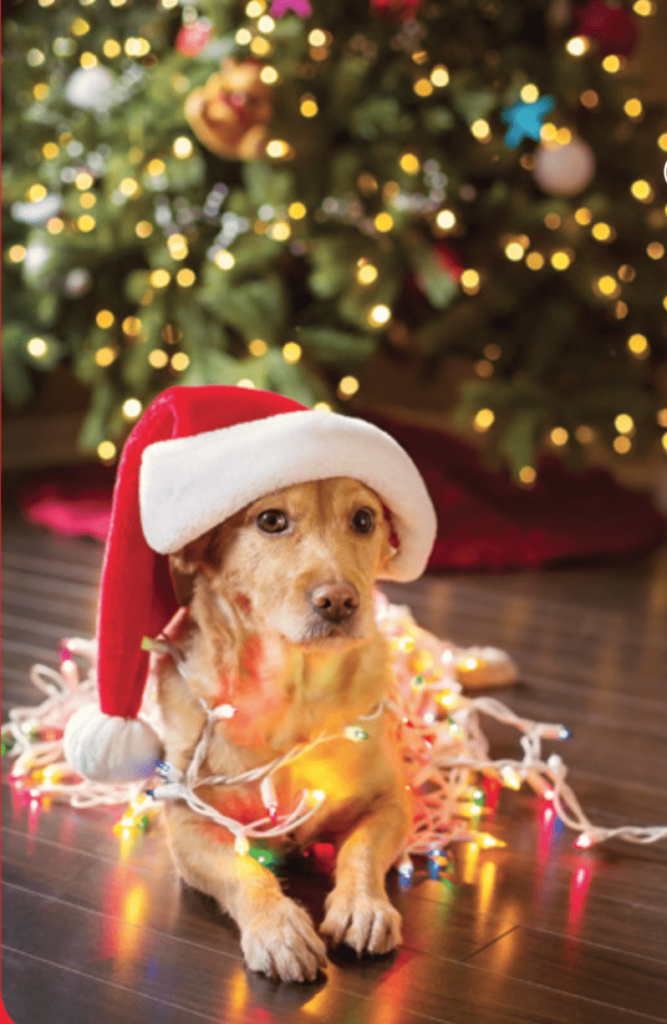
The holidays are a festive time of year, but many of the items we use to celebrate may cause harm to our pets. Be aware of these dangers in order to keep your holiday activities from being interrupted by a visit to the Animal Emergency Clinic.
Decorations
Ornaments and tinsel for the tree are not poisonous but can cause serious health problems for your pets. Tinsel is a very attractive toy to cats. They are mesmerized by the shiny reflective surface and movement. If ingested, the tinsel will bunch in the intestinal tract and cause a blockage requiring expensive and invasive surgery. If left too long, it can even cause rupture of the intestines, which can be fatal.
Dogs have been known to ingest ornaments, including the glass variety. Hard to imagine why, but not only can it cause intestinal blockage, but the sharp glass can cause lacerations from the esophagus to the colon. The wire hooks can get caught in the throat of dogs and cats causing discomfort and a trip to your vet.
Gift wrap ribbon is notorious for causing blockages in cats. As much as cats love to play with ribbon it causes severe intestinal blockage. The intestines cannot move the long string so it bunches like an accordion and causes major inflammation and then slices through the intestinal wall, leaking fecal material into the abdomen which can cause a fatal abdominal infection.
Avoid tinsel if you have feline companions, and keep glass ornaments up high and ribbons tucked away to protect your pets this and every holiday season.
Holiday lighting and candles pose a different risk to pets. Electrical shock may occur when a pet chomps down on an electrical cord causing mouth lacerations and possible death. Check your holiday lights for evidence of chewing and use a grounded three-prong extension cord as a safety precaution. Place lit candles out of reach so that pets cannot burn themselves on the flame or on spilt wax.
Plants
Holiday plants may be pretty, but some plants may be toxic to your pets.
- Holly can cause intense vomiting, diarrhea and lethargy/depression.
- Mistletoe when ingested can cause vomiting, diarrhea, difficulty breathing, changes in behavior, hallucinations, and even death.
- Poinsettias can cause irritation to the mouth and stomach upset and vomiting.
- Pine needles can produce oral irritation, vomiting, diarrhea, lethargy, trembling and hind end weakness. Christmas tree water may contain fertilizers, which if ingested can cause stomach upset. Stagnant tree water may contain bacteria which can lead to vomiting and diarrhea.
Food Items
One of the best parts of the holidays is all the yummy food served. But many of these items can cause problems for your pets. Bones and fat from turkey should never be given to your pet. Turkey bones are a common cause of intestinal obstruction and the fat can cause a serious condition called Pancreatitis. Pancreatitis is a painful condition that involves severe inflammation of the pancreas, which can cause vomiting, diarrhea, and hospitalization.
Chocolate
Chocolate treats are a must at holiday parties; however, chocolate and cocoa that contains Theobromine, a toxic chemical to dogs and cats, can cause serious side effects. The toxicity of the chocolate depends on the amount and the type of chocolate ingested:
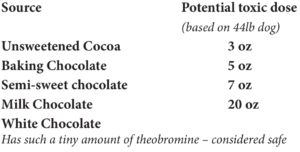
Early clinical signs (within 1-4 hours of ingestion) include restlessness, hyperactivity, muscle spasms, and increased heart rate. Signs that may occur later depending on dose; increased thirst, urinary incontinence, vomiting, and diarrhea. Most serious complications may be seizures, coma, death from abnormal heart rhythm, or kidney failure a few days after ingestion. If you have questions regarding toxic amounts from your pet’s ingestion of chocolate, please call your veterinarian or a poison hotline. (ASPCA Animal Poison Control Center 1-888-426-4435).
Common in many cookies and candies are nuts. Certain nuts should not be given to pets. Almonds, walnuts and pistachios can cause stomach upset, or in large volumes can cause obstruction of your dog’s throat or intestinal tract. Macadamia nuts can cause weakness in the hind limbs, pain, tremors and low grade fever all which resolve in 48 hours. Other holiday items like Fruit cakes which contain grapes and raisins can result in kidney failure in dogs. Casseroles that contain onions or garlic can cause damage to a dog or cat’s red blood cells which can cause severe anemia. Depending on dose, a blood transfusion may be required.
Alcohol is commonly served at holiday house parties as a beverage or in baked items. Because alcohol is rapidly absorbed into the bloodstream, it affects pets quickly. Ingestion can cause vomiting, disorientation, along with dangerous drops in blood sugar, blood pressure and body temperature. Intoxicated animals can experience seizures and respiratory failure.
Other winter hazards
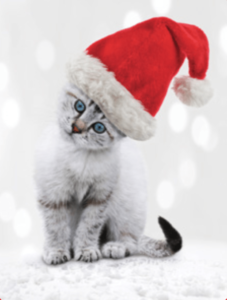 As we fight the cold and protect our automobiles, antifreeze can be a temptation to many pets as it has a pleasant taste. Unfortunately, very small amounts can be lethal. As little as one teaspoon can be fatal to cats, and less than four teaspoons can be dangerous to a small dog. Antifreeze forms crystals in pet’s urine that causes severe damage to kidneys. Avoid this hazard by placing automotive products in areas pets do not have access to, cleaning up spills thoroughly, and purchasing “Low tox” brands of antifreeze that contain propylene glycol which is safer for pets.
As we fight the cold and protect our automobiles, antifreeze can be a temptation to many pets as it has a pleasant taste. Unfortunately, very small amounts can be lethal. As little as one teaspoon can be fatal to cats, and less than four teaspoons can be dangerous to a small dog. Antifreeze forms crystals in pet’s urine that causes severe damage to kidneys. Avoid this hazard by placing automotive products in areas pets do not have access to, cleaning up spills thoroughly, and purchasing “Low tox” brands of antifreeze that contain propylene glycol which is safer for pets.
Ice melting products can cause problems for pets depending on the actual ingredient and the quantity ingested. It can be irritating to the skin and mouth, and if ingested excessive drooling, depression, vomiting or electrolyte imbalances may occur.
During this holiday season, while you are celebrating or working to stay warm, be aware of these dangers for your pet, so that your entire family can have a happy and safe holiday season.
If you have a concern contact your veterinarian or the ASPCA Animal Poison Control Center 1-888-426-4435.
About the Author
 Erin Quigley, DVM, Member of AVMA, MVMA, grew up in Florissant, MO, and received a Bachelor’s degree in Biology at Missouri State University. After college she worked as a receptionist at Rock Road Animal Hospital, a zookeeper at the St. Louis Zoo and a veterinary assistant at Howdershell Animal Hospital until attendingVeterinary School at University of Missouri-Columbia. Dr. Quigley graduated with her Doctorate of Veterinary Medicine and worked as a veterinarian in Troy, Wentzville, and Florissant, MO, until purchasing Animal Medical Center of Wentzville in 2010. She lives with her husband, two children and boxer dog Finnegan in Lake St. Louis/O’Fallon. When my husband and
Erin Quigley, DVM, Member of AVMA, MVMA, grew up in Florissant, MO, and received a Bachelor’s degree in Biology at Missouri State University. After college she worked as a receptionist at Rock Road Animal Hospital, a zookeeper at the St. Louis Zoo and a veterinary assistant at Howdershell Animal Hospital until attendingVeterinary School at University of Missouri-Columbia. Dr. Quigley graduated with her Doctorate of Veterinary Medicine and worked as a veterinarian in Troy, Wentzville, and Florissant, MO, until purchasing Animal Medical Center of Wentzville in 2010. She lives with her husband, two children and boxer dog Finnegan in Lake St. Louis/O’Fallon. When my husband and
I have free time from the clinic, we enjoy spending time with our dog, family and friends. Our hobbies include attending Cardinal baseball and Mizzou football games. We also enjoy the outdoors biking, boating and horseback riding.
